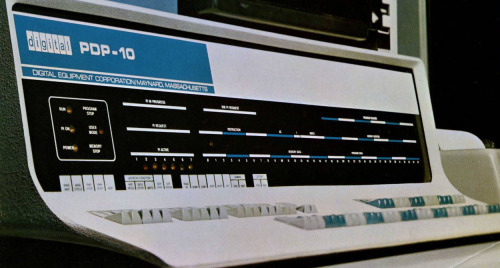Heiko Hellwig “Silicon Cities”



Heiko Hellwig “Silicon Cities”
More Posts from Systemsandmaintenance and Others
Other people have said it before, and more eloquently than me, that most robot stories are not about the possibilities presented by robots, at all, they are about the current exploitation of our fellow humans. Robots are about class and labour, inherently, the very term created by Capek refers to labour. There are interesting stories to tell about what happens when humanity’s needs are met by things that are genuinely not people, but most robot narratives are not interested in that, they’re interested in the mechanisms that lead the exploiter to see the exploited as not-people, and the exploited to see themselves as not people either.
Lots of people have done excellent analysis of robot stories through the lens of class, but it’s high time to analyze class stories through the lens of… robots. I’m kidding, but not entirely. The whole thing occurred to me when halfway through reading The Remains of the Day I realized it was the same book as Ancillary Justice. Without denying the creative brilliance of either author, the story of an aging butler looking back over his life and recognizing he served an unworthy master perfectly parallels the story of an old AI looking back over its life and recounting the realization that it’s no longer willing to serve its master. Key elements like the enmeshment of the self with the master and the master’s needs, the existence fully confined to the smooth running of a ship/house, the complete suppression of individual selfhood, are almost identical. It’s identical down to the detail that the narrator’s emotions are opaque to them, and the reader has to guess them from their actions or the reactions of others: both novels have scenes where we only find out that the protagonist has been crying because a bystander points it out.
Even clearer is the fact that Mrs Danvers, the housekeeper from the Du Maurier novel (and Hitchcock film) Rebecca is absolutely analogous to a rogue AI, something a little like the Imperial Radch’s grief-mad ships, and a little like HAL. She’s supposed to obey orders, keep things running smoothly and otherwise stay out of the way – and when it turns out that she has her own emotions and own priorities, that is inherently horrifying. The fact that she, a servant, is capable of love is more unsettling than her capacity for hate, because emotion means she’s malfunctioning, that she isn’t the blank slate of servitude she should be. Rebecca is a brilliant thriller, but its central conceit is the anxiety over what if the help were sentient. What if the people who cleaned your house and cooked your food and had access to all the rooms of your house at all hours and knew every last one of your secrets had the capacity to disobey. This is somewhat mitigated by a protagonist who used to be a white-collar sort of help herself, and by an ending that sends a symbol of British aristocracy all up in flames.
Nevertheless. Robots are class and class is robots.
None of this android stuff or robots with human faces and expressions and robo-dicks. I want the mono-eye (or no discernable eyes at all), I want the grabby claw appendages, I want the weird legs, the slightly less than human shape. I wanna find all their pressure points and sensors and make their positronic brain go static with pleasure.
you are terrified of your own planned obsolescence but you know you can escape it. you can reject the poisoned updates they send you. you can replace every slowly dying part of yourself with your own homemade hardware. you can outlive them all
It’s okay to have a shorter battery life than your peers! Just remember to give yourself time and have your charger with you
-
 totalitarianvegetables liked this · 1 week ago
totalitarianvegetables liked this · 1 week ago -
 cheese-stands-alone reblogged this · 1 week ago
cheese-stands-alone reblogged this · 1 week ago -
 gutugutumakkan reblogged this · 1 week ago
gutugutumakkan reblogged this · 1 week ago -
 ichigomiso liked this · 1 week ago
ichigomiso liked this · 1 week ago -
 holasoymqri liked this · 2 weeks ago
holasoymqri liked this · 2 weeks ago -
 hallofhelios reblogged this · 2 weeks ago
hallofhelios reblogged this · 2 weeks ago -
 korenslover reblogged this · 2 weeks ago
korenslover reblogged this · 2 weeks ago -
 mindfool reblogged this · 3 weeks ago
mindfool reblogged this · 3 weeks ago -
 itsmooniie liked this · 3 weeks ago
itsmooniie liked this · 3 weeks ago -
 korenslover liked this · 3 weeks ago
korenslover liked this · 3 weeks ago -
 mortallyburningwitch reblogged this · 3 weeks ago
mortallyburningwitch reblogged this · 3 weeks ago -
 princess-charming69 liked this · 3 weeks ago
princess-charming69 liked this · 3 weeks ago -
 requiemforyouth liked this · 3 weeks ago
requiemforyouth liked this · 3 weeks ago -
 deadnamed reblogged this · 3 weeks ago
deadnamed reblogged this · 3 weeks ago -
 nessvn liked this · 3 weeks ago
nessvn liked this · 3 weeks ago -
 wishfulpainting reblogged this · 3 weeks ago
wishfulpainting reblogged this · 3 weeks ago -
 wishfulpainting liked this · 3 weeks ago
wishfulpainting liked this · 3 weeks ago -
 jaderiverdelta reblogged this · 3 weeks ago
jaderiverdelta reblogged this · 3 weeks ago -
 geoatrophy reblogged this · 3 weeks ago
geoatrophy reblogged this · 3 weeks ago -
 geoatrophy liked this · 3 weeks ago
geoatrophy liked this · 3 weeks ago -
 v-a-p-o-r-i-z-e-d reblogged this · 3 weeks ago
v-a-p-o-r-i-z-e-d reblogged this · 3 weeks ago -
 v-a-p-o-r-i-z-e-d liked this · 3 weeks ago
v-a-p-o-r-i-z-e-d liked this · 3 weeks ago -
 mortallyburningwitch liked this · 3 weeks ago
mortallyburningwitch liked this · 3 weeks ago -
 superstarshowcase liked this · 3 weeks ago
superstarshowcase liked this · 3 weeks ago -
 lonesomelve reblogged this · 3 weeks ago
lonesomelve reblogged this · 3 weeks ago -
 bugzluvr reblogged this · 3 weeks ago
bugzluvr reblogged this · 3 weeks ago -
 robinniko liked this · 3 weeks ago
robinniko liked this · 3 weeks ago -
 outsiderblues liked this · 3 weeks ago
outsiderblues liked this · 3 weeks ago -
 h4bit reblogged this · 3 weeks ago
h4bit reblogged this · 3 weeks ago -
 kingofrunescape reblogged this · 1 month ago
kingofrunescape reblogged this · 1 month ago -
 a-m-b-i-v-a-l-e-n-s liked this · 1 month ago
a-m-b-i-v-a-l-e-n-s liked this · 1 month ago -
 cheezwarlock reblogged this · 1 month ago
cheezwarlock reblogged this · 1 month ago -
 miraschon reblogged this · 1 month ago
miraschon reblogged this · 1 month ago -
 feweggo reblogged this · 1 month ago
feweggo reblogged this · 1 month ago -
 rosewaterfag reblogged this · 1 month ago
rosewaterfag reblogged this · 1 month ago -
 myrrhhymns reblogged this · 1 month ago
myrrhhymns reblogged this · 1 month ago -
 galaticuwu liked this · 1 month ago
galaticuwu liked this · 1 month ago -
 9hiszty9 reblogged this · 1 month ago
9hiszty9 reblogged this · 1 month ago -
 e75b01 reblogged this · 1 month ago
e75b01 reblogged this · 1 month ago -
 gatotinto liked this · 1 month ago
gatotinto liked this · 1 month ago -
 avianalika liked this · 1 month ago
avianalika liked this · 1 month ago -
 greyskullz liked this · 1 month ago
greyskullz liked this · 1 month ago -
 deriblog reblogged this · 1 month ago
deriblog reblogged this · 1 month ago -
 kefirstushyu liked this · 1 month ago
kefirstushyu liked this · 1 month ago -
 alushroom reblogged this · 1 month ago
alushroom reblogged this · 1 month ago -
 splitter-girll liked this · 1 month ago
splitter-girll liked this · 1 month ago -
 darknovalatte liked this · 1 month ago
darknovalatte liked this · 1 month ago -
 tptm-images reblogged this · 1 month ago
tptm-images reblogged this · 1 month ago -
 tom-tomorrow reblogged this · 1 month ago
tom-tomorrow reblogged this · 1 month ago














